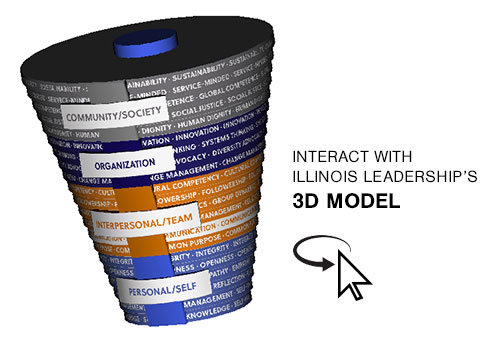Trending
- April 25, 2025
ILLINOIS MODEL OF LEADERSHIP

A list of competencies provides goals, directions, and outcomes for leadership educators and learners. Competencies help the campus to inclusively define the knowledge, skills, and attitudes necessary for effective leadership practice, and they provide a structure to communicate how leadership-specific knowledge, skills, and attitudes are inter-related.
At the ILC, we believe that leadership can be taught. While some may have more inherent skills, everyone can enhance and refine their abilities to lead others. So we have created a set of core competencies, better known as the Illinois Model of Leadership, that we believe all effective leaders should possess. Below is a video of Dr. Gayle Spencer (Director) and Dr. Beth Hoag (Associate Director) discussing the model.
History of the Illinois Model of Leadership
The Illinois Leadership® Center strives to be an internationally acclaimed provider of leadership education. The ILC has always relied on a clear mission, vision, philosophy of leadership, and a set of core leadership skills to ensure Illinois students are learning what is necessary to be a more effective leader. Before the doors of the ILC opened in 2002, a committee of faculty, staff, and students were charged by then Vice Chancellor for Student Affairs Dr. Pat Askew to create a set of guiding doctrine to inform and shape the practice of the leadership at Illinois. This committee created the Illinois Philosophy of Leadership and 11 Skills & Attributes, in which the ILC utilized to develop the center’s curriculum and programs for over ten years. This same committee also worked to create and structure the initial plans for the ILC, which later included formally establishing this advisory committee as the Illinois Leadership Coordinating Committee, ILCC (now known as the Illinois Leadership Education Campus Collaborative, ILECC).
In 2014-2015, the ILC sought out to reimagine the doctrine that guided the ILC and the broader University’s practice of leadership education. In the fall of that year, four sessions of Campus Conversations on Leadership Education were held. Over 260 faculty, staff, and students participated in the task of identifying the skills, value, attributes an Illinois graduates should demonstrate. Over 3000 post it notes were generated, which then provided themes for competencies and approaches to cultivate leadership on campus.What resulted was a white paper on “An Illinois Model of Leadership Education”, which includes four elements:
- philosophy of leadership,
- leadership learning and practice,
- leadership competencies, and
- a leadership assessment (The Illinois Leadership Inventory)
The cornerstone of our work is based on the Illinois Philosophy of Leadership.
Illinois Philosophy of Leadership
Leaders are individuals who work with others to create positive change. Leadership can be practiced by anyone interested in making a contribution, regardless of formal authority or position.
Leadership development begins with self-knowledge—understanding one’s passions, motivations, strengths, limits, and personal values. Leaders are committed to continual self-discovery, reflection, and learning.
Learning to work with others is essential, since leadership never happens alone.
Leadership is exercised as members of teams, business, civic, and community organizations, and as global citizens. Leaders recognize and value the multitude of voices, opinions, experiences, and identities in our workplaces and communities, and as leaders, we work to promote greater inclusivity and respect.
At the University of Illinois, students learn and practice leadership in their academic coursework and out of classroom activities.
Illinois Leadership Competencies

1. PERSONAL/SELF LEVEL
The practice of effective leadership begins within oneself. Leaders work to develop a set of individual skills and attitudes necessary for being productive members of society. To review resources related to this level of practice, visit the library’s libguide.
- Self-Knowledge
- Self-Management
- Reflection
- Empathy
- Openness
- Integrity
2. INTERPERSONAL/TEAM LEVEL
Effective leadership requires working with and influencing others to achieve common goals and shared vision. Leaders need to develop skills for building personal, authentic, and productive relationships. To review resources related to this level of practice, visit the library’s libguide.
- Common Purpose
- Communication
- Relationship Management
- Group Dynamics
- Followership
- Cultural Competency
3. ORGANIZATION LEVEL
Significant accomplishments achieved within organizations are the result of teams interacting together. Leaders must navigate systems and influence people when they do not have interpersonal relationships with all others. To review resources related to this level of practice, visit the library’s libguide.
- Change Management
- Diversity Advocacy
- Systems Thinking
- Innovation
4. COMMUNITY/SOCIETY LEVEL
The values and actions of individuals, teams, and organizations interact with and affect the broader communities in which they are situated. Leaders are role models and influencers with several communities simultaneously, and must possess skills and attitudes consistent with success in this larger context. To review resources related to this level of practice, visit the library’s libguide.
- Human Dignity
- Social Justice
- Global Competence
- Service-Minded
- Sustainability
Leadership education at the University of Illinois consists of developing competence in a set of skills and attitudes within each Level.
© 2023, www.modelilgov.org/. All rights reserved/HOME/privacy-policy/ sitemap